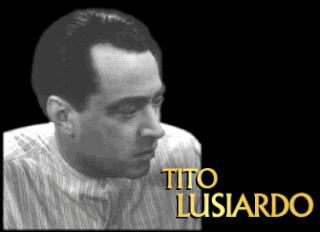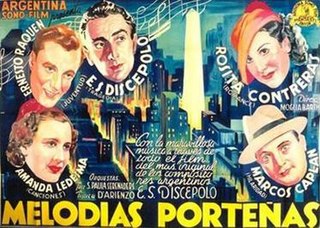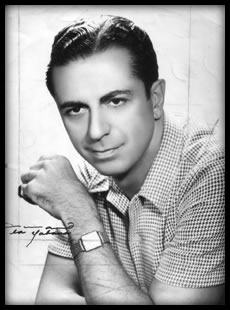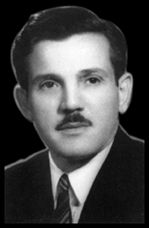Argentina Sono Film S.A.C.I. is an entertainment company based in Buenos Aires that produced many of the major films during the classic period of Argentine cinema from 1933. In its current format, it serves as a production and distribution company.

Francisco Múgica was an Argentine film director, film editor and cinematographer. He was born and died in Buenos Aires.

Luis Bayón Herrera was a Spanish film director and screenwriter who worked in Argentine film of the 1940s and 1950s. He was "one of the most important directors of the golden age of Argentine cinema".
Leopoldo Torres Ríos was an Argentine film director and screenwriter. His brother Carlos Torres Ríos was a notable cinematographer. His son was the film director and screenwriter Leopoldo Torre Nilsson.

Mario Soffici was an Italian-born Argentine film director, actor and screenwriter of the classic era.

Pierre Bruno Hugo Fontana, otherwise known as Hugo del Carril, was an Argentine film actor, film director and tango singer of the classic era.

Luis César Amadori was an Italian-Argentine film director and screenwriter and one of the most influential directors in the cinema of Argentina of the classic era. He directed over 60 films between 1936 and 1967, writing the scripts to over 50 pictures.

Manuel Romeo was an Argentine film director, screenwriter, dramatist and score composer, and one of the influential directors in the cinema of Argentina of the classic era. He directed and wrote over 50 films between 1931 and 1951 even composing the musical scores for several.

Tito Lusiardo was an iconic Argentine film actor and tango singer of the classic era.

Roque Funes was the most prolific Argentine cinematographer in the history of the Cinema of Argentina whose career spanned over 40 years of cinema.

Luis Sandrini was a prolific Argentine comic film actor and film producer. Widely considered one of the most respected and most acclaimed Argentine comedians by the public and critics. He made over 80 appearances in film between 1933 and 1980.

Melodías porteñas is a 1937 Argentine film, a musical directed by Luis Moglia Barth, who also co-wrote it. It is based on a struggling radio station, and depicts the events leading up to and following the disappearance of the station's star tango singer, played by Amanda Ledesma. It may be seen as an exposé of the sensationalism of radio stations of the period. Enrique Santos Discépolo won praise for his performance as the increasingly desperate director of the station.

Juan Carlos Thorry, born José Antonio Torrontegui, was an Argentine film actor, tango musician and director.

Martín Garralaga was a Spanish actor who worked in Hollywood from the 1930s through the 1960s. He was married to opera singer and actress Rosa Rey.
Oscar Valicelli was an Argentine film actor.

Olinda Bozán was an Argentine film actress and comedian of the Golden Age of Argentine Cinema (1940–1960). Born into a circus family, she acted on the vaudeville circuit, and performed in silent and sound movies. She was trained by the Podestá brothers, one of whom she married, who have one of the most prestigious Argentine acting awards named for them. Bozán appeared in 75 films and was considered one of the best comic actors of Argentine cinema in the 20th century.

Mario Maurano was an Argentine film score composer and pianist, best remembered for his tangos. He was especially known for his orchestral work supporting starlet Libertad Lamarque, with songs including Te quiero (1946) and many more. He was a frequent collaborator with director Luis Moglia Barth in the Golden Age of Argentine cinema, and was particularly prolific in the late 1930s and 1940s, composing for films such as Twelve Women (1939), Confesión (1940), Con el dedo en el gatillo (1940), Huella (1940), and Boína blanca (1941). He also worked on films such as Caminito de Gloria (1939) with Luis César Amadori, and La Verdadera victoria (1944) with Carlos F. Borcosque.

Lumiton is a former film production company and current museum located in Munro, Buenos Aires, Argentina. Lumiton Studios was founded in 1932 at the start of the golden age of film in that country. Its lowbrow, populist films appealed to local audiences and were highly successful in Argentina and throughout Latin America. It was the main competitor to Argentina Sono Film in the 1940s.

George Andreani, pseudonym Josef Dvořáček (born as Josef Kumok; 28 February 1901 in Warsaw, Poland – 2 April 1979 in Buenos Aires, Argentina) was a Polish composer, film score composer, pianist, conductor, and actor. He was noted for his scores of some 75 Argentine films during the Golden Age of Argentine cinema from 1937 to 1959. Aside from his prolific work as a score composer, he was also conductor of the Orquesta Sinfónica Schenley in the 1940s.















